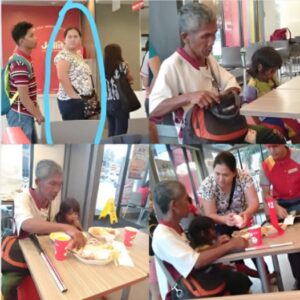It should have been just an ordinary Tuesday morning. The sun was shining brightly on the cracked earth, and the streets of San Miguel del Monte were quiet — except for a thin woman walking, carrying a small bag of bread and an old thermos of coffee. Her name was Lucía Herrera , 42 years old, a widow who worked in the market to earn enough for her daily meals.

But that morning, something stopped him.
Under the shade of an abandoned bus stop, she saw them: a man and his little son — motionless, pale, and barely breathing. The father’s arm was still wrapped around the child, as if protecting him from the world’s cruelty, even in his final moments. Lucía stopped. At first, she thought they were just sleeping. But when she saw the child’s lips — parched, cracked, and blackening — she froze.
“Señor… are you okay?” he whispered, his voice trembling.
There was no answer. Only the sound of the wind could be heard.
Lucía’s heart beat fast as she knelt beside them. Her skin was cold. Her clothes were torn. Next to the child, a paper bag — empty, except for a few grains of rice. She was hungry. Very hungry.
Lucía didn’t think anymore. She didn’t look to see if there was a camera. She just acted. She took the bread out of the bag, broke it into pieces, and placed it in the boy’s hand. She held the father’s arm and said softly:
“You are not alone… don’t let go, please…”
He shouted for help, over and over, on the road. But no one came.
And then, something inside him exploded. He picked up the child’s thin body, his tears mixing with the dust, and ran — ran barefoot along the dirt road to the small clinic at the edge of town.
Those who saw it said they saw Lucía running — desperate, almost losing hope, carrying the weak child, while her cries echoed in the silence of the morning.
When he arrived at the clinic, it was too late.
The father and son are gone.
Lucía fell to the floor, hugged the child’s cold hand, and whispered repeatedly:
“I should have come earlier… My God… I should have come earlier…”
But the story didn’t end there.
When Lucía returned home, she carried a heavy memory with her. In her small house made of wood and metal, she sat on the edge of the bed, unable to eat, unable to sleep. As she stared at the remaining piece of bread on the table, she decided — she would no longer remain silent.
The next day, he went to the plaza and began a simple task: he brought a table, a pot of porridge, and a card with the following written on it:
“For the hungry. Free. No questions asked.”
No media. No sponsors. No news.
But a girl took a picture of him and posted it on social media. The caption simply read:
“Aling Lucía, every day gives food to strangers. Just yesterday, someone died of hunger in our town. Now, there is hope.”
Within hours, the post went viral. Thousands of netizens shared, commented, and offered help. People from Manila, Cebu, and Davao sent donations. Some said, “I want to help him.” Others wrote, “This is the kind of heroism that doesn’t need to be featured on TV.”
Later, reporters arrived. They tried to interview Lucía, but she refused.
“I didn’t do this to be famous,” he said. “I did this because I don’t want another child to starve to death while we watch.”
Weeks passed, and Lucía’s small table became a community kitchen. Every day, dozens of families ate there. Those who had never had anything to eat now had a reason to believe again.
Even the local government was forced to take notice of the situation. They built a feeding center, naming it “Project Lucía.”
But for Lucía, the best part wasn’t the compliments.
One afternoon, as she was pouring porridge into a boy’s bowl, he smiled and said,
“Thank you, Mother Lucía. I want to be like you when I grow up.”
And there, he smiled — a smile full of hope, peace, and a serenity that money cannot buy.
A few months later, a mural was painted on the wall of the plaza: a picture of Lucía holding a loaf of bread, and below it was written,
“You don’t have to be rich to save a life. You just need a heart.”
And to every visitor to the town of San Miguel del Monte, one will always hear the story of a woman without a camera, without a name, but with a heart of gold —
a simple shopkeeper who reminded everyone: heroism is not always loud or colorful; sometimes, it is quiet, true, and comes from hunger — not from the stomach, but from the soul.
